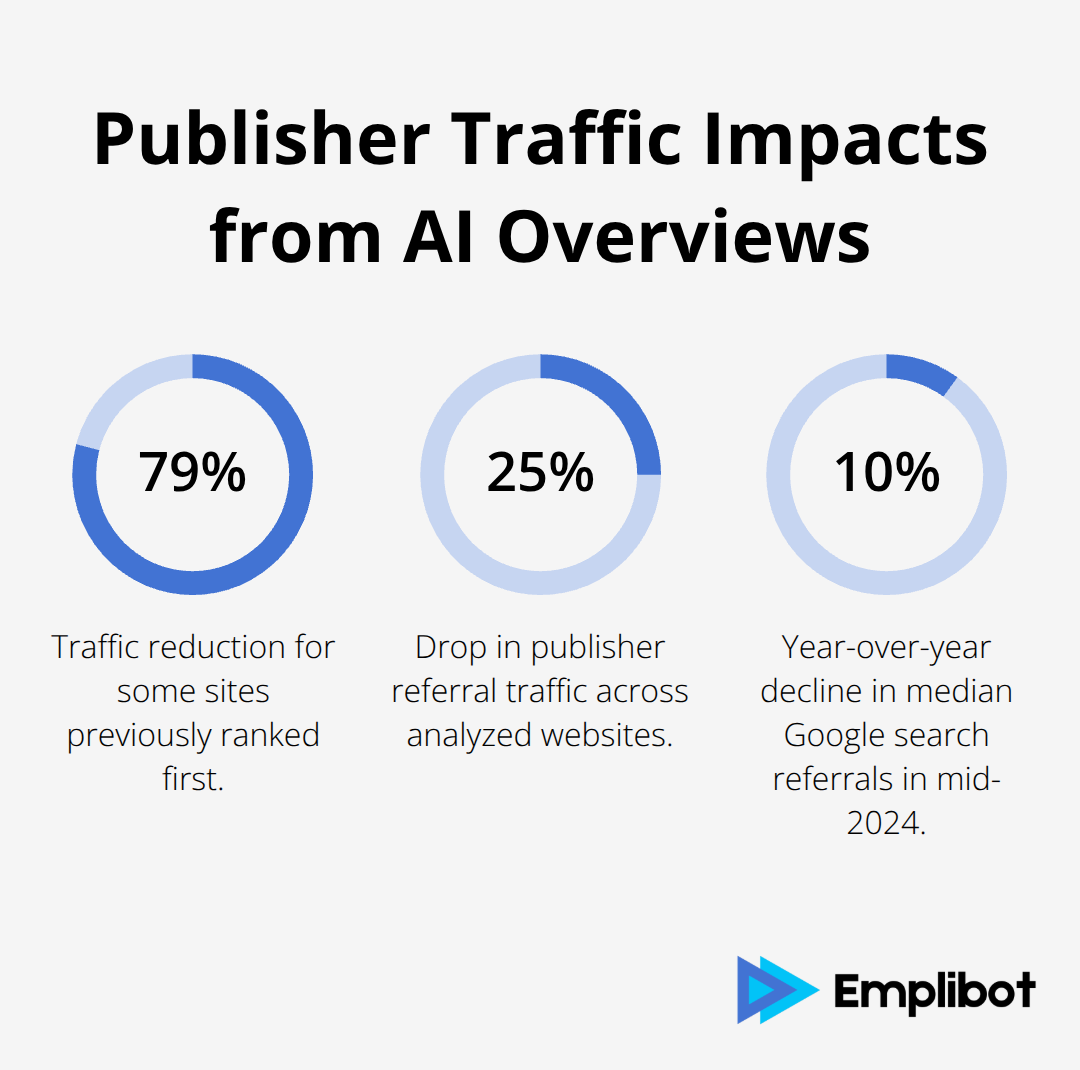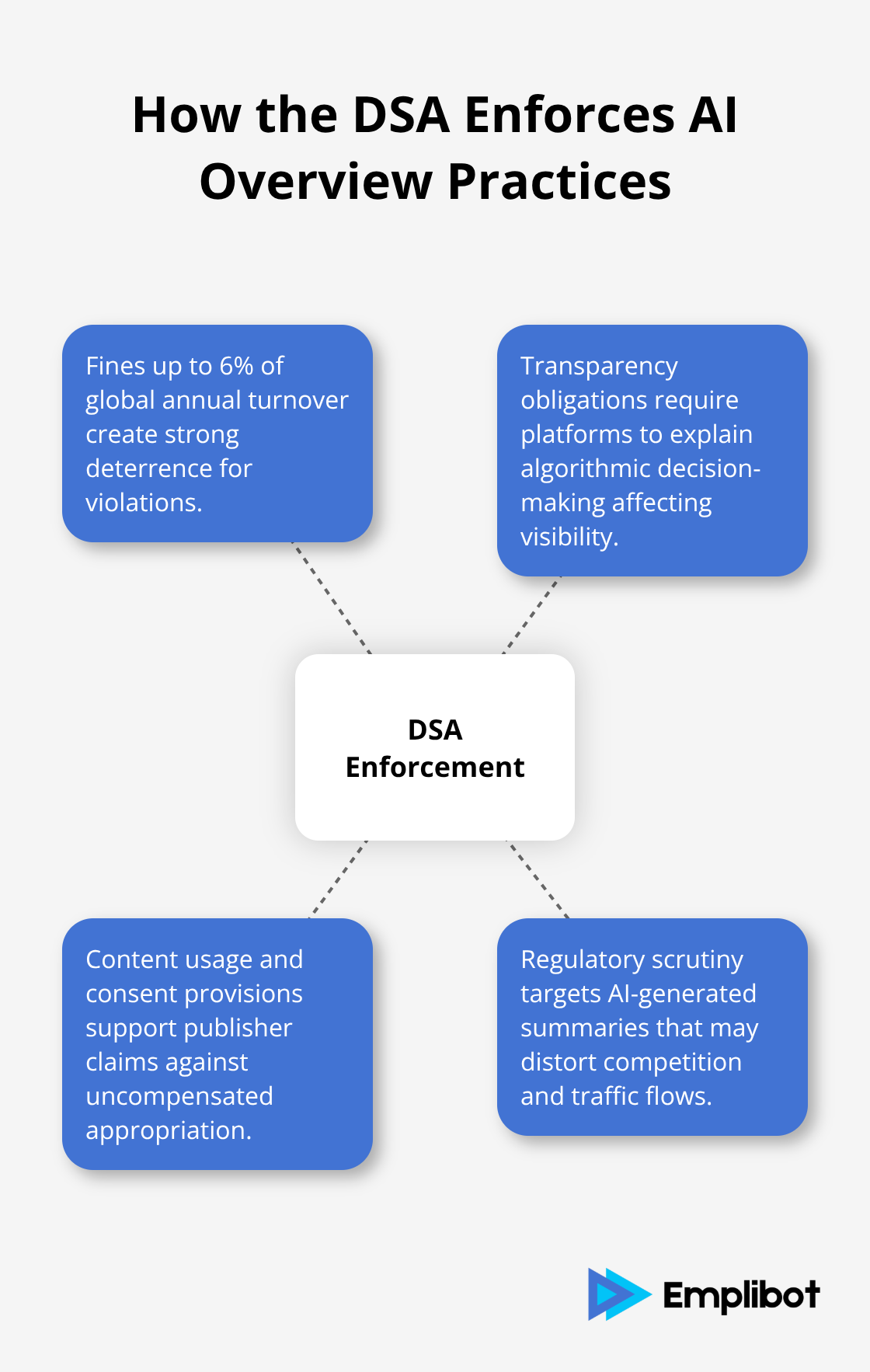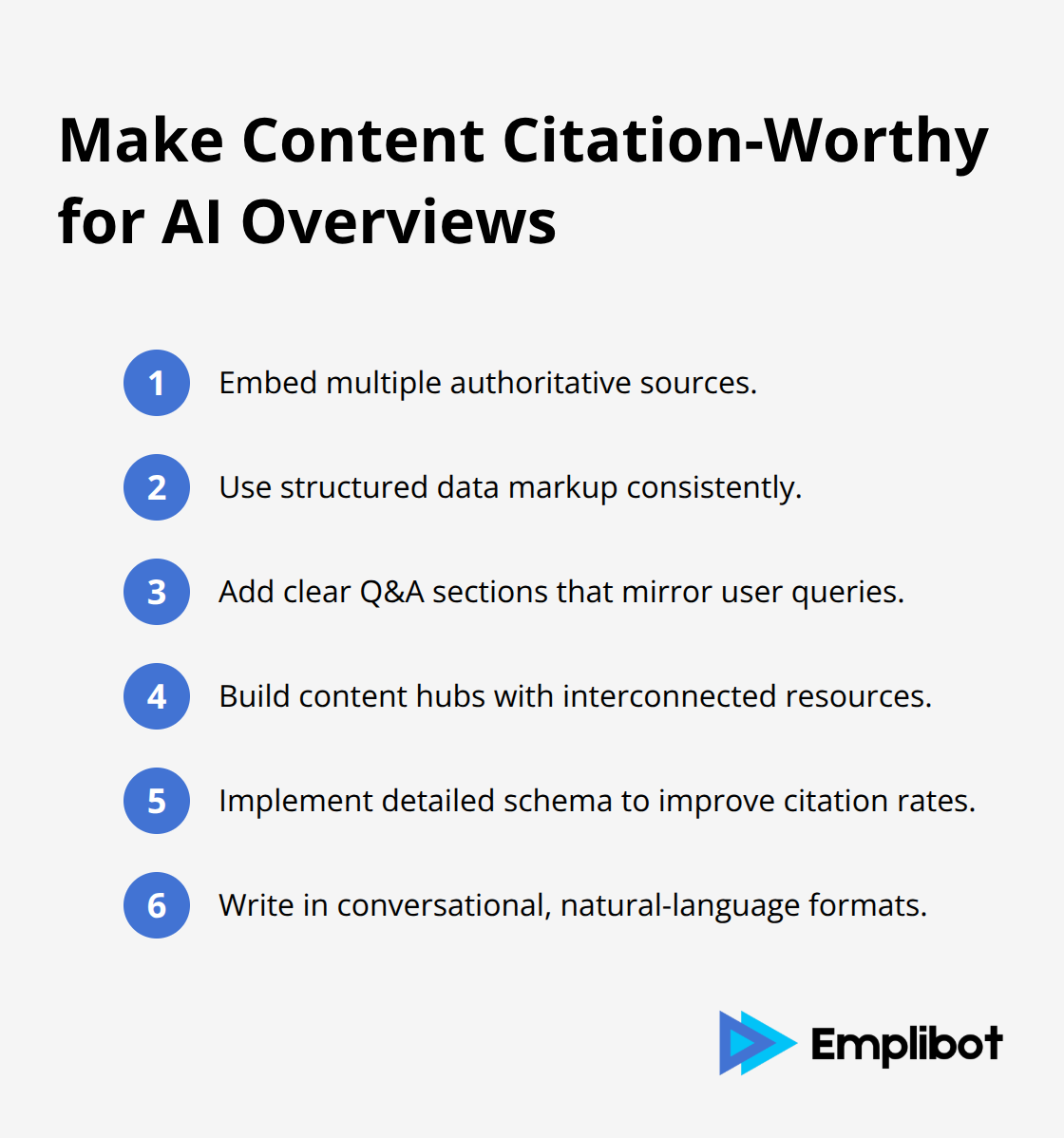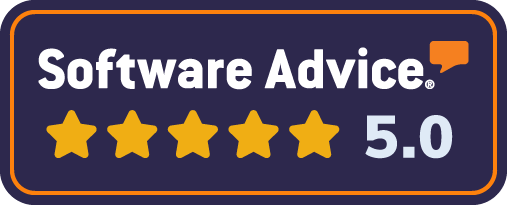Italian publishers have escalated their fight against Google’s AI Overviews, with FIEG filing a formal complaint citing significant traffic losses. This marks a turning point in how European media companies respond to AI-powered search features.
We at Emplibot see these EU publisher actions against AI Overviews as part of a broader regulatory shift that will reshape content strategy across Europe. Publishers must adapt quickly to survive this transformation.
Contents
ToggleItalian Publishers Challenge AI Overviews
The Federation of Italian Newspaper Publishers filed their complaint with Italy’s communications watchdog Agcom in late 2024, targeting Google’s AI Overviews feature directly. FIEG represents newspaper publishers across Italy and claims Google’s AI-generated summaries violate the EU Digital Services Act by reducing traffic by up to 79% for sites previously ranked first.
Traffic Losses Hit Publisher Revenue Hard
Publishers report devastating financial impacts from AI Overviews implementation. The New York Times and Condé Nast documented a two-to-one ratio of traffic losses compared to gains during May and June 2024, while UK lifestyle publishers saw click-through rates plummet from 5.1% to 0.6% despite maintaining top search rankings. Digital Content Next found a 25% drop in publisher referral traffic across analyzed websites, with median Google search referral traffic declining 10% year-over-year in mid-2024. These traffic reductions translate directly into advertising revenue losses for publishers who depend on page views for monetization.

Publishers Target Content Usage Rights
FIEG’s legal strategy focuses on Google’s unauthorized use of publisher content to train AI systems without compensation. Publishers cannot opt out of Google’s AI crawler without losing search visibility entirely (creating what the complaint calls an abuse of market dominance). The Independent Publishers Alliance argues this practice threatens independent journalism viability, while European publishers coordinate similar complaints through the European Newspaper Publishers’ Association across multiple EU member states.
Google Disputes Publisher Claims
Google disputes the accuracy of studies that criticize AI Overviews, labeling the methodologies as flawed. The company maintains it sends billions of clicks to websites daily and claims new AI experiences enhance discovery for content and businesses. Google’s spokesperson asserts that AI Overviews actually improve content discoverability rather than harm it.
This legal battle sets the stage for broader regulatory scrutiny across Europe, where multiple member states now examine how AI technologies impact their media landscapes.
European Regulatory Landscape for AI Content
The European Commission reviews multiple complaints filed under the Digital Services Act, with Italy leading regulatory action through comprehensive AI legislation passed in September 2025. This legislation includes restrictions on child AI access and penalties for harmful uses like deepfakes, with criminal provisions targeting unlawful dissemination of AI-generated content punishable by one to five years imprisonment. Competition authorities across member states launch parallel investigations, with the UK’s Competition and Markets Authority confirming receipt of complaints while maintaining that Google dominates 93% of the UK search market.
German and French Publishers Unite Against AI Overviews
Publisher coalitions in Germany and France coordinate through the European Newspaper Publishers’ Association to file synchronized complaints across multiple jurisdictions. These coordinated efforts target Google’s practice of preventing publishers from opting out of AI training without losing search visibility entirely. Media associations believe that Google’s AI summaries violate the DSA as websites are visited less frequently due to these features. European publishers demand that the Commission impose interim measures to prevent irreparable harm to competition and protect news access (arguing that Google’s data challenging traffic loss claims remains incomplete and misleading).
Competition Authorities Examine Market Dominance
The US Department of Justice reviews potential remedies that could separate Google’s AI crawler from its search crawler, providing a regulatory template for European authorities. Judge Amit Mehta could issue injunctions mandating service separation, offering immediate relief for publishers facing traffic declines. European regulators examine whether Google’s integration of advertisements into AI Overviews since May 2024 constitutes additional market abuse, while publishers advocate for stricter frameworks governing how tech companies utilize content in AI applications without proper compensation structures.
Digital Services Act Enforcement Mechanisms
The Digital Services Act provides European regulators with enforcement tools to address AI Overview practices that harm publisher traffic. Member states can impose fines up to 6% of global annual turnover for violations, creating significant financial pressure on tech companies.

The Act requires platforms to demonstrate transparency in algorithmic decision-making (particularly relevant for AI-generated content summaries that affect publisher visibility). Publishers leverage these provisions to argue that Google’s AI features violate fair competition principles by appropriating content without adequate compensation or consent mechanisms.
These regulatory developments create the foundation for publishers to adapt their content strategies to survive in an AI-dominated search landscape, as the European AI market will grow at a CAGR of 33.2% while the regulatory environment surrounding data privacy grows increasingly complex.
Publisher Strategy Adaptations to AI Overviews
Publishers must restructure their content approach to maintain visibility in an AI-dominated search environment. The shift requires strategic changes across content formats, performance measurement, and distribution channels.
Source-Rich Explainer Content Development
Publishers need comprehensive explainer articles with extensive source attribution. AI systems prioritize content that provides depth and credibility when they generate summaries. Articles should embed multiple authoritative sources, use structured data markup, and format content with clear question-and-answer sections that mirror natural language queries.

Content hubs with interconnected resources demonstrate authority that answer engines prioritize. Publishers who create detailed schema markup see higher citation rates in AI responses, while those who rely on traditional SEO approaches lose visibility rapidly.
Performance Tracking for AI Overview Citations
Publishers must monitor which URLs appear in AI Overviews rather than track traditional click-through metrics. Analytics tools should identify when content gets cited in AI-generated responses and measure brand mentions across different search queries.
The focus shifts from traffic generation to citation frequency and brand attribution. Publishers need systems that track mention patterns and identify which content formats receive the most AI citations (helping them optimize future content production accordingly).
Answer-Engine-Friendly Content Formats
Smart publishers diversify into FAQ formats, step-by-step guides, and comparison articles that answer specific user questions directly. Voice search constitutes 20.5% of searches globally, which makes conversational content formats important for search presence maintenance.
Content should address natural language queries with structured responses. Publishers who adapt their editorial calendars to include question-based headlines and comprehensive answer formats position themselves better for AI citation opportunities than those who maintain traditional article structures. AI Overviews in Europe have transformed the digital landscape, making content adaptation essential for success.
Final Thoughts
Publishers must prepare for multiple traffic scenarios as EU Publisher Actions Against AI Overviews continue to reshape the digital landscape. Conservative estimates suggest 15-30% traffic declines within 12 months, while aggressive AI rollouts could reduce referrals by 50%. Publishers should model revenue impacts across these scenarios and develop contingency plans for each outcome.
Regulatory monitoring requires systematic tracking of Digital Services Act enforcement actions, competition authority investigations, and new AI legislation across member states. Publishers need alerts for Google policy changes, court decisions that affect content usage rights, and coalition opportunities with other media organizations. The transformation demands operational changes across editorial teams, analytics systems, and revenue models.
Publishers who adapt their content workflows to emphasize citation-worthy expertise while diversifying traffic sources will survive this shift. Long-term content strategy adjustments center on building brand authority beyond search dependence through newsletters, mobile apps, and social media presence. Emplibot automates WordPress blogs and social media, helping publishers maintain consistent content production during this transition period.










